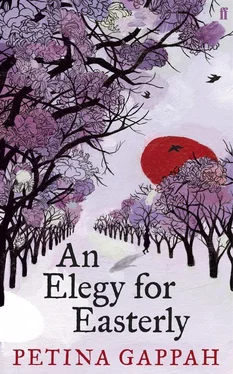Petina Gappah - An Elegy for Easterly
Здесь есть возможность читать онлайн «Petina Gappah - An Elegy for Easterly» весь текст электронной книги совершенно бесплатно (целиком полную версию без сокращений). В некоторых случаях можно слушать аудио, скачать через торрент в формате fb2 и присутствует краткое содержание. Год выпуска: 2009, Издательство: Faber & Faber, Жанр: Современная проза, на английском языке. Описание произведения, (предисловие) а так же отзывы посетителей доступны на портале библиотеки ЛибКат.
- Название:An Elegy for Easterly
- Автор:
- Издательство:Faber & Faber
- Жанр:
- Год:2009
- ISBN:нет данных
- Рейтинг книги:4 / 5. Голосов: 1
-
Избранное:Добавить в избранное
- Отзывы:
-
Ваша оценка:
- 80
- 1
- 2
- 3
- 4
- 5
An Elegy for Easterly: краткое содержание, описание и аннотация
Предлагаем к чтению аннотацию, описание, краткое содержание или предисловие (зависит от того, что написал сам автор книги «An Elegy for Easterly»). Если вы не нашли необходимую информацию о книге — напишите в комментариях, мы постараемся отыскать её.
An Elegy for Easterly — читать онлайн бесплатно полную книгу (весь текст) целиком
Ниже представлен текст книги, разбитый по страницам. Система сохранения места последней прочитанной страницы, позволяет с удобством читать онлайн бесплатно книгу «An Elegy for Easterly», без необходимости каждый раз заново искать на чём Вы остановились. Поставьте закладку, и сможете в любой момент перейти на страницу, на которой закончили чтение.
Интервал:
Закладка:
‘Martha, she is ever so swollen.’
‘ Ho nhai? ’
He indicated with his arms and said again, ‘Her stomach is this big.’
‘ Hoo ,’ his mother said without looking up. One half of her mind was on the work before her, and the other half was on another matter: should she put elaborate candlewick on this duvet, or should she walk all the way to Mai James’s to make a call to follow up on that ten million she was owed? Mai James operated a phone shop from her house. She walked her customers to a hillock at the end of the Farm and stood next to them as they telephoned. On the hillock, Mai James opened the two mobiles she had, and inserted one SIM card after the other to see which would get the best reception. Her phone was convenient, but there was this: from Mai James came most of the gossip at Easterly.

In her home, Martha slept.
Her name and memory, past and dreams, were lost in the foggy corners of her mind. She lived in the house and slept on the mattress on which a man called Titus Zunguza had killed first his woman, and then himself. The cries of Titus Zunguza’s woman were loud in the night. Help would have come, for the people of Easterly lived to avoid the police. But by the time Godwills Mabhena who lived next to Mai James had crossed the distance to Titus Zunguza’s house, by the time he had roused a sufficient number of neighbours to enter, help had come too late. And when the police did come, they were satisfied that it was no more than what it was.
Six months after the deaths, when blood still showed on the mattress, Martha claimed the house simply by moving in. As the lone place of horror on Easterly, the house was left untouched; even the children acted out the terror of the murderous night from a distance.
They called her Martha because Mai James said that was exactly how her husband’s niece Martha had looked in the last days when her illness had spread to her brain. ‘That is how she looked,’ Mai James said. ‘Just like that, nothing in the face, just a smile, and nothing more.’
It was the children who called her Mupengo, Mudunyaz, and other variations on lunacy. The name Martha Mupengo stuck more than the others, becoming as much a part of her as the dresses of flamboyantly coloured material, bright with exotic flowers, poppies and roses and bluebells, dresses that had belonged to Titus Zunguza’s woman and that hung on Martha’s thin frame.
She was not one of the early arrivals to Easterly.
She did not come with those who arrived after the government cleaned the townships to make Harare pristine for the three-day visit of the Queen of England. All the women who walk alone at night are prostitutes, the government said — lock them up, the Queen is coming. There are illegal structures in the townships they said — clean them up. The townships are too full of people, they said, gather them up and put them in the places the Queen will not see, in Porta Farm, in Hatcliffe, in Dzivaresekwa Extension, in Easterly. Allow them temporary structures, and promise them real walls and doors, windows and toilets.
And so the government hid away the poverty, the people put on plastic smiles and the City Council planted new flowers in the streets.
Long after the memories of the Queen’s visit had faded, and the broken arms of the arrested women were healed, Easterly Farm took root. The first wave was followed by a second, and by another, and yet another. Martha did not come with the first wave, nor with the next, nor with the one after that. She just appeared, as though from nowhere.
She did not speak beyond her request for twenty cents.
Tobias, Tawanda and the children thought this just another sign of madness, she was asking for something that you could not give. Senses, they thought, we have five senses and not twenty, until Tobias’s father, Ba Toby, the only adult who took the trouble to explain anything, told them that cents were an old type of money, coins of different colours. In the days before a loaf of bread cost half a million dollars, he said, one hundred cents made one dollar. He took down an old tin and said as he opened it, ‘We used the coins as recently as 2000.’
‘Eight years years ago, I remember,’ said an older child. ‘The five cent coin had a rabbit, the ten cents a baobab tree. The twenty had … had … umm, I know … Beit Bridge.’
‘Birchenough Bridge,’ said Ba Toby. ‘Beitbridge is one word, and it is a town.’
‘The fifty had the setting sun …’
‘Rising sun,’ said Ba Toby.
‘And the dollar coin had the Zimbabwe Ruins,’ the child continued.
‘Well done, good effort,’ said Ba Toby. He spoke in the hearty tones of Mr Barwa, his history teacher from Form Three. He, too, would have liked to teach the wonders of Uthman dan Fodio’s Caliphate of Sokoto and Tshaka’s horseshoe battle formation, but providence in the shape of the premature arrival of Tobias had deposited him, grease under his nails, at the corner of Kaguvi Street and High Road, where he repaired broken-down cars for a living.
As he showed them the coins, he remembered a joke he had heard that day. He repeated it to the children. ‘Before the President was elected, the Zimbabwe ruins were a prehistoric monument in Masvingo province. Now, the Zimbabwe ruins extend to the whole country.’ The children looked at him blankly, before running off to play, leaving him to laugh with his whole body shaking.
The children understood that Martha’s memory was frozen in the time before they could remember, the time of once upon a time, of good times that their parents had known, of days when it was normal to have more than leftovers for breakfast. ‘We danced to records at Christmas,’ Ba Toby was heard to say. ‘We had reason to dance then, we had our Christmas bonuses.’
Like Martha’s madness, the Christmas records and bonuses were added to the games of Easterly Farm, and for the children it was Christmas at least once a week.

In the mornings, the men and women of Easterly washed off their sleep smells in buckets of water that had to be heated in the winter. They dressed in shirts and skirts ironed straight with coal irons. In their smart clothes, thumbing lifts at the side of the road, they looked like anyone else, from anywhere else.
The formal workers of Easterly Farm were a small number: the country had become a nation of informal traders. They were blessed to have four countries bordering them: to the north, Zambia, formerly one-Zambia-one-nation-one-robot-one-petrol-station, Zambia of the joke currency had become the stop of choice for scarce commodities; to the east, Mozambique, their almost colony, kudanana kwevanhu veMozambiki neZimbabwe , reliant on their solidarity pacts and friendship treaties, on their soldiers guarding the Beira Corridor; this Mozambique was now the place to withdraw the foreign money not available in their own country; to the west, Botswana, how they had laughed at Botswana with no building taller than thirteen storeys, the same Botswana that now said it was so full of them that it was erecting a fence along the border to electrify their dreams of three meals a day; and, to the south, cupping Africa in her hands of plenty, Ndazo, ku South, Joni, Jubheki, Wenera, South Africa.
They had become a nation of traders.
So it was that in the mornings, the women of the markets rose early and caught the mouth of the rooster. In Mbare Musika they loaded boxes of leaf vegetables, tomatoes and onions, sacks of potatoes, yellow bursts of spotted bananas. They took omnibuses to Mufakose, to Kuwadzana and Glen Norah to stand in stalls and coax customers.
Читать дальшеИнтервал:
Закладка:
Похожие книги на «An Elegy for Easterly»
Представляем Вашему вниманию похожие книги на «An Elegy for Easterly» списком для выбора. Мы отобрали схожую по названию и смыслу литературу в надежде предоставить читателям больше вариантов отыскать новые, интересные, ещё непрочитанные произведения.
Обсуждение, отзывы о книге «An Elegy for Easterly» и просто собственные мнения читателей. Оставьте ваши комментарии, напишите, что Вы думаете о произведении, его смысле или главных героях. Укажите что конкретно понравилось, а что нет, и почему Вы так считаете.












